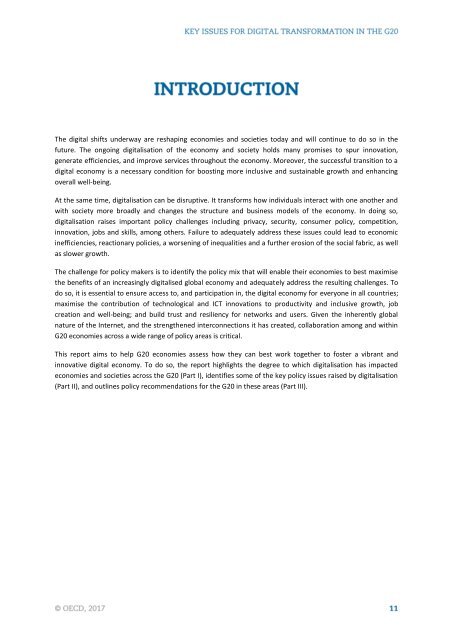KEY ISSUES FOR DIGITAL TRANSFORMATION IN THE G20
2jz0oUm
2jz0oUm
You also want an ePaper? Increase the reach of your titles
YUMPU automatically turns print PDFs into web optimized ePapers that Google loves.
The digital shifts underway are reshaping economies and societies today and will continue to do so in the<br />
future. The ongoing digitalisation of the economy and society holds many promises to spur innovation,<br />
generate efficiencies, and improve services throughout the economy. Moreover, the successful transition to a<br />
digital economy is a necessary condition for boosting more inclusive and sustainable growth and enhancing<br />
overall well-being.<br />
At the same time, digitalisation can be disruptive. It transforms how individuals interact with one another and<br />
with society more broadly and changes the structure and business models of the economy. In doing so,<br />
digitalisation raises important policy challenges including privacy, security, consumer policy, competition,<br />
innovation, jobs and skills, among others. Failure to adequately address these issues could lead to economic<br />
inefficiencies, reactionary policies, a worsening of inequalities and a further erosion of the social fabric, as well<br />
as slower growth.<br />
The challenge for policy makers is to identify the policy mix that will enable their economies to best maximise<br />
the benefits of an increasingly digitalised global economy and adequately address the resulting challenges. To<br />
do so, it is essential to ensure access to, and participation in, the digital economy for everyone in all countries;<br />
maximise the contribution of technological and ICT innovations to productivity and inclusive growth, job<br />
creation and well-being; and build trust and resiliency for networks and users. Given the inherently global<br />
nature of the Internet, and the strengthened interconnections it has created, collaboration among and within<br />
<strong>G20</strong> economies across a wide range of policy areas is critical.<br />
This report aims to help <strong>G20</strong> economies assess how they can best work together to foster a vibrant and<br />
innovative digital economy. To do so, the report highlights the degree to which digitalisation has impacted<br />
economies and societies across the <strong>G20</strong> (Part I), identifies some of the key policy issues raised by digitalisation<br />
(Part II), and outlines policy recommendations for the <strong>G20</strong> in these areas (Part III).


